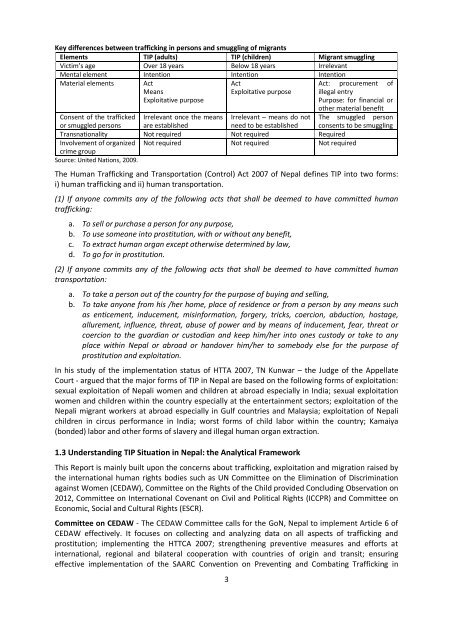TRAFFICKING IN PERSONS
1Spfyta
1Spfyta
You also want an ePaper? Increase the reach of your titles
YUMPU automatically turns print PDFs into web optimized ePapers that Google loves.
1.4 Data and Methods<br />
This Report is prepared through using both primary and secondary data. Secondary data were used<br />
by reviewing annual progress Reports of Ministry of Women, Children and Social Welfare<br />
(MoWCSW), Ministry of Labor and Employment (MoLE), Department of Foreign Employment (DoFE),<br />
Foreign Employment Tribunal (FET), Foreign Employment Promotion Board (FEPB), Office of the<br />
Attorney General (OAG), the Supreme Court, the National Human Rights Commission (NHRC)<br />
including the Annual or progress Reports of several Non-Governmental Organizations (NGOs).<br />
Further, relevant websites were also visited extensively. Recent studies conducted by the<br />
institutions/individuals were also studied.<br />
In relation to the primary data collection, NHRC-OSRT designed a questionnaire format for collection<br />
of data from the both Governmental and non-Governmental organizations. For each of the relevant<br />
organizations, a special set of questionnaire was designed and sent via e-mail to the concerned<br />
organizations for their response. The questionnaire format sent to the NGOs captured i) introduction<br />
of the NGOs, ii) activities related to prevention and number of beneficiaries, iii) activities related to<br />
protection and number of beneficiaries, iv) activities related to the prosecution and number of<br />
beneficiaries and v) activities related to the networking, coordination and collaboration and research<br />
studies conducted so far. Further, the organizations were asked about the activities carried out after<br />
the deadly earthquake of April 25, 2015. Some of the NGOs provided their responses in the<br />
prescribed format while others sent their Annual Reports for a review.<br />
The Draft report was shared among the key stakeholders of anti-trafficking initiatives in December<br />
15, 2015. The workshop was organized by NHRC aiming to share the major findings of the Report<br />
and also obtain suggestions to improve the Report. The workshop was chaired by Honorable<br />
Member of the NHRC, Mrs. Mohna Ansari. There were altogether 45 participants in the workshop.<br />
The feedback from the workshop was incorporated in the Final Report. The Draft Report was also<br />
shared with the Honorable Chairperson and Commissioners of NHRC and their feedback were<br />
incorporated before finalization of this Report.<br />
Ethical Issues – Throughout the Report, the name of the trafficked survivors has been changed and if<br />
required the location and other identity of the survivors were also changed or not written for the<br />
purpose of confidentiality.<br />
1.5 Limitation of the Study<br />
The key limitation of this Report is positioned to the extent of validity of the data produced by<br />
different GOs and I/NGOs regarding the prevention, protection and prosecution status of TIP. This<br />
limitation comes because Nepal does not have a centralized counter-trafficking database system.<br />
While utilizing the data/information from different sources including of research/studies, the Report<br />
attempts to scrutinize the validity of data/information by examining the methodology employed by<br />
the research/studies/reports. The UN High Commissioner for Human Rights (UNHCR) Recommended<br />
Principles and Guidelines on Human Rights and Human Trafficking urges the states to use the<br />
internationally agreed definition of trafficking while collecting and maintaining data on trafficking<br />
and ensure that data on trafficking survivors disaggregated in line with age, sex, ethnicity and other<br />
relevant attributes.<br />
Another limitation of this Report comes from the possibility overlapping information/data, especially<br />
in case of protection and prosecution related services provided by the GOs and I/NGOs. A trafficked<br />
survivor, for example, may be intercepted by more than one organizations and it is likely that each<br />
organization would count his/her as a beneficiary. Further, caution must be borne in mind while<br />
dealing with the data related to prevention, protection, prosecution related services that one person<br />
may be counted in different services.<br />
5


